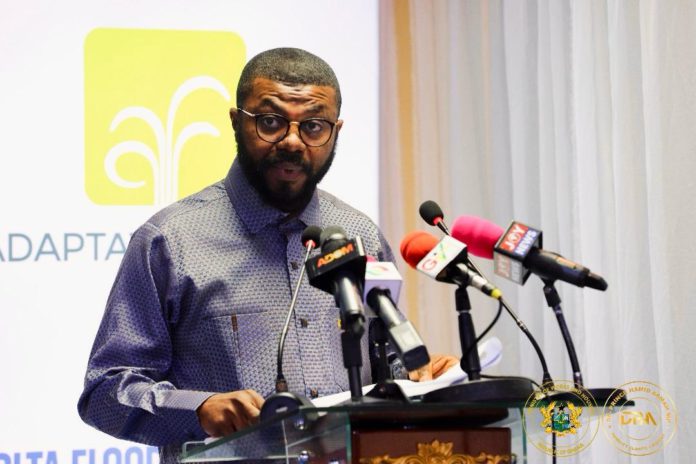The Deputy Minister of Works and Housing, Dr Prince Hamid Armah has emphasised the importance of technological advancements in climate change adaption and resilience.
In the face of increasing climate-related challenges such as extreme weather events, floods, droughts, rising sea levels, and heatwaves the Kwesiminstim Member of Parliament (MP) has said early warnings are indispensable tools.
Speaking at the closing ceremony of the Volta Flood and Drought Management (VFDM) Project, Dr Armah stated that, these tools help to minimise the adverse impacts on lives, livelihoods, infrastructure, and ecosystems.
“Early Warning Systems (EWS) for flood and drought prediction play a pivotal role in climate resilience and adaptation strategies, serving as a crucial line of defense against the escalating impacts of climate change.
“These systems provide timely, accurate, and reliable information about impending extreme weather events, allowing communities, governments, and organisations to prepare and respond adequately and effectively. In essence, they transform uncertainty into actionable
intelligence,” he explained.
In this regard, he touted the government has demonstrated commitment in reinforcing early warning systems.
Dr Armah noted that, government has supported the Ghana Meteorological Agency(GMet) through the recruitment and procurement of equipment and enacting the Ghana Hydrological Authority Act, 2022 to protect lives and livelihoods.
“Additionally, government has procured 26 Automatic Weather Stations (AWS), Calibration Equipment, a Message Switching System, and 15 vehicles to enhance the efficiency of GMet’s operations in delivering weather and climate services in Ghana,” he noted.
Dr. Armah urged continued collaboration to enhance global resilience, emphasising that early warning systems were lifelines for communities facing climate change challenges.
The VFDM project was a five-year plan which began in 2019 and has successfully developed the systems for reducing vulnerabilities and increasing community resilience in the Volta Basin riparian countries comprised of Benin, Burkina Faso, Côte d’Ivoire, Ghana, Mali, and Togo.
It was implemented by the Volta Basin Authority in collaboration with the Global Water Partnership and the World Meteorological Organisation aimed at enhancing flood and drought management and early warning systems in the Volta Basin.
ALSO READ:


